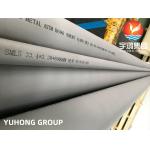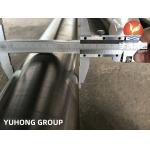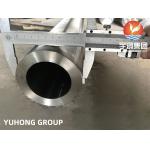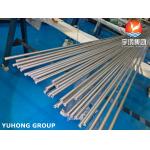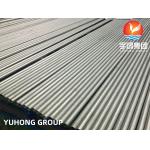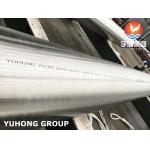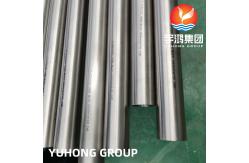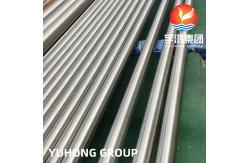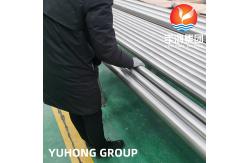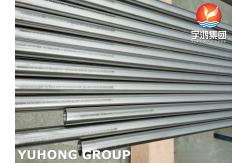ASTM B861 GR.2 Titanium Alloy Pipe Seamless Heat Exchanger
Application
The ASTM B861 specification covers the requirements for 34 grades
of titanium and titanium alloy seamless pipe intended for general
corrosion resisting and elevated temperature service. Produced
through processes such as hot extrusion, hot rolling, or cold
drawing to ensure that the pipe body has no welds and uniform
overall performance. ASTM B861 GR.2 is typically supplied in an
annealed state to achieve optimal plasticity, toughness, and
corrosion resistance, facilitating subsequent bending, welding, and
processing. It may also provide a cold working state with higher
strength and slightly lower plasticity.
ASTM B861 Chemical Composition Requirements (%) | Composition | Grade1 (R50250) | Grade2 (R50400) | | Carbon | 0.08 | 0.08 | Oxygen | 0.18 | 0.25 | Nitroge | 0.03 | 0.03 | Hydrogen | 0.015 | 0.015 | | Iron | 0.20 | 0.30 |
What are the core characteristics and advantages of ASTM B861 GR.2
Titanium Alloy Pipe? - Excellent Corrosion Resistance: ASTM B861 GR.2 titanium alloy pipe can form a stable and dense
titanium oxide (TiO2) protective film in oxidizing environments
such as seawater, salt water, wet chlorine, hypochlorite, nitric
acid, chromic acid, etc., which protects the tube from corrosion.
At the same time, its corrosion resistance in chloride ion
environments is much better than stainless steel, and its
sensitivity to crevice corrosion is also higher than GR.7, GR.12
and other higher alloyed titanium materials.
- Good Mechanical Properties & Fabricability: The strength of ASTM B861 GR.2 titanium alloy pipe belongs to the
medium strength grade of industrial pure titanium, which is
stronger than Gr. 1 and weaker than Gr. 3. It is enough to meet the
needs of many chemical and marine engineering applications, while
maintaining good plasticity and high elongation, usually greater
than or equal to 20%, and is easy to form by cold bending, flaring,
flanging and other forming processes. However, due to the low
thermal conductivity, low elasticity and stickiness of ASTM B861
GR.2, it is necessary to select appropriate cutting tools and
cutting parameters.
- Good Biocompatibility: ASTM B861 Gr. 2 pure titanium is one of the most biocompatible
metal materials and is widely used in human implants such as bone
screws, bone plates, joint components, and medical devices such as
surgical instruments and diagnostic equipment components. However,
when used as an implant, it usually needs to meet more stringent
special standards, such as ASTM F67.
What are the nondestructive testing requirements for ASTM B861 GR.2
Titanium Alloy Pipe?
The ASTM B861 GR.2 titanium alloy pipe should be subjected to a
hydrostatic test or a nondestructive electric test (usually
referred to as an eddy current test). At the same time, according
to customer requirements, more stringent tests can be provided,
such as Ultrasonic Testing (UT), which is used to detect
longitudinal and transverse defects, cracks, inclusions, folds,
etc. According to ASTM E213 standards, with high sensitivity; Eddy
Current Testing (ET), which is mainly used to detect surface and
near-surface defects according to ASTM E426/E426M standards.
ASTM B861 GR.7 Titanium Alloy Steel Heat Exchanger Pipe Application
Area - Chemical & Petrochemical: heat exchangers (tube/shell), condensers, reactors, containers,
pipeline systems for transporting corrosive media such as
chlor-alkali, nitric acid, and organic chlorides.
- Marine Engineering & Desalination: seawater cooling system pipelines, seawater desalination
equipment, ship pipeline systems, offshore platform structures and
pipelines.
- Power Generation: power station condenser tubes, flue gas desulfurization (FGD)
system components, geothermal system pipelines.
- Aerospace: hydraulic system pipelines, engine nacelles, environmental control
system pipelines.
- Medical & Pharmaceutical: medical devices, pharmaceutical equipment pipelines.
|
